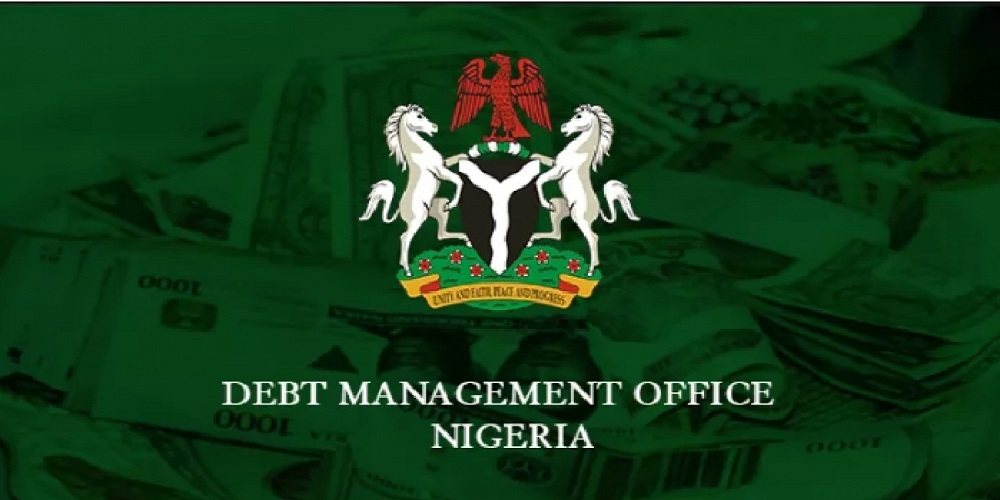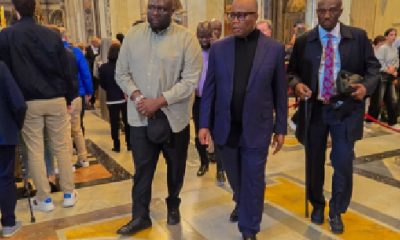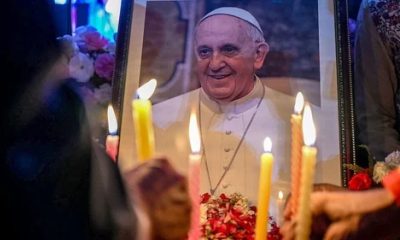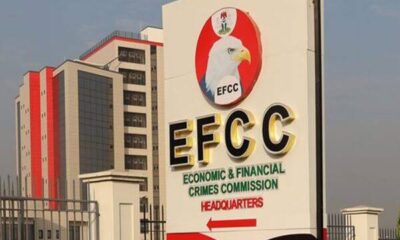Economy
13 new governors borrowed N226.8bn in six months – DMO

In the first six months after taking office, 13 new state governors collectively borrowed N226.8bn from domestic and external financiers.
This emerged as findings by Sunday PUNCH showed that 16 state governors also increased the debt profile of their states by N509.3bn with domestic and external debt of N243.95bn and $298.5m (N265.37bn), respectively.
The external debt was calculated based on the exchange rate of N889/$ used by the Debt Management Office in its report.
This is according to an analysis of the latest sub-national debt reports released by the DMO.
The sub-national debts are classified into domestic borrowings from local creditors and external borrowings from international creditors like the World Bank and the International Monetary Fund.
The domestic and external debts published on the DMO’s website were as of December 30 and June 30, 2023, respectively.
The states, which include Benue, Cross Rivers, Katsina, Niger, Plateau, Rivers, Zamfara, and the Federal Capital Territory, got N115.57bn from domestic creditors, while governors of Ebonyi, Kaduna, Kano, Niger, Plateau, Sokoto, Taraba and Zamfara states borrowed $125.1m (N111.24bn) from external sources.
For the sub-nationals, a further breakdown of the data showed that Cross Rivers Governor, Bassey Otu, took the highest loan, with N16.2bn from domestic and $57.95m from foreign creditors between June and December 2023.
Katsina State followed with the debt surging by N36.93bn from N62.37bn to N99.3bn by December 2023.
Third on the list is Niger State, with a domestic debt of N17.85bn, surging from N121.95bn in June 2023 to N139.8bn by December of the same year.
Plateau got N16.32bn; Rivers borrowed N7.07bn; Zamfara, N14.26bn; and the FCT under the leadership of Nyesom Wike borrowed N6.75bn from domestic creditors.
For foreign debt, Governor Francis Nwifuru of Ebonyi State accumulated external debt of $37.54m, while Governor Uba Sani of Kaduna State borrowed $17.69m from external financiers.
Similarly, the governors of Kano borrowed $6.6m; Niger, $1.27m; Plateau, $831,008; Sokoto, $499,472; Taraba, $1.51m; and Zamfara, $655,563, from external sources.
Despite declarations by the administration of President Bola Tinubu that it would not continue with the massive borrowings of the previous government to fund its expenditures, the latest developments show that the new government is sticking to the controversial policy amidst increased revenue.
In 2023, state governors got the most Federal Account Allocation Committee allocations in at least seven years. The rise in FAAC allocations to the three tiers of government, especially the states, followed the removal of subsidy on petrol and currency reforms by the Tinubu administration. The reforms have reportedly led to a 40 per cent boost in income.
An analysis of the 2023 FAAC monthly allocations revealed that the sub-national and local government councils got the highest allocation of N627.73bn in September, followed by N610.5bn in December, N555.75bn in August, N533bn in November, N514bn in July and N497.97bn in October.
Economy
More Nigerians to experience poverty by 2027 – World Bank

The World Bank’s latest Africa’s Pulse report has projects a grim future for Nigeria, with poverty expected to rise by 3.6 percentage points by 2027.
Released during the IMF and World Bank Spring Meetings in Washington, DC, the report cites Nigeria’s reliance on oil, economic fragility, and governance challenges as key drivers.
It highlights the country’s structural economic weaknesses, dependence on oil revenues, and national fragility as key barriers to meaningful poverty reduction.
“Poverty in resource-rich, fragile countries, including large economies like Nigeria and the Democratic Republic of Congo, is projected to increase by 3.6 percentage points between 2022 and 2027,” the report stated.
Despite recent growth in Nigeria’s non-oil sector during the last quarter of 2024, the World Bank warns that this progress is unlikely to translate into widespread poverty alleviation due to ongoing fiscal and institutional challenges.
The report emphasizes that Sub-Saharan Africa remains the world’s poorest region, with an overwhelming 80% of the globe’s 695 million extreme poor residing there in 2024.
Within the region, half of the 560 million extremely poor people were located in just four countries, including Nigeria.
In stark contrast, South Asia accounted for 8% of the world’s extremely poor population, East Asia and the Pacific 2%, the Middle East and North Africa 5%, and Latin America and the Caribbean 3%.
The World Bank attributes the rising poverty in Nigeria and similar economies to weakening oil prices and fragile governance structures, noting: “This follows a well-established pattern whereby resource wealth combined with fragility or conflict is associated with the highest poverty rates, averaging 46% in 2024, which is 13 percentage points higher than in non-fragile, resource-rich countries.”
Meanwhile, non-resource-rich countries in Africa are experiencing stronger economic growth and faster poverty reduction, buoyed by high agricultural commodity prices and more resilient fiscal policies.
To reverse Nigeria’s downward poverty trend, the World Bank recommends reforms that prioritize inclusive economic growth and stronger public financial management.
It calls on the government to focus on “improving fiscal management and building a stronger fiscal contract with citizens to promote inclusive economic development and long-term poverty alleviation.”
Economy
SEE current exchange rate of the Dollar to Naira

What Is the Dollar to Naira Exchange Rate at the Black Market (Aboki FX)?
Here is the Dollar to Naira exchange rate at the parallel market, popularly known as the black market (Aboki fx), for Tuesday, April 23, 2025.
You can exchange your dollars for naira at the following rates:
Black Market Exchange Rate (Lagos – April 23, 2025):
According to sources at the Bureau De Change (BDC), the exchange rate at the Lagos parallel market saw traders buying at ₦1610 and selling at ₦1620 per US dollar.
It’s important to note that the Central Bank of Nigeria (CBN) does not recognize the black market. The CBN advises individuals seeking foreign exchange transactions to do so through their banks.
Dollar to Naira Exchange Rates
Market Type Buying Rate Selling Rate
Black Market ₦1610 ₦1620
CBN Official Rate ₦1591 (Low) ₦1606 (High)
Note: Forex rates vary across dealers and regions, and actual rates may differ from those listed.
Meanwhile, the Nigeria Customs Service (NCS) has announced the seizure of 298 smuggled items worth ₦7.6 billion between January and March 2025. The NCS also disclosed that it generated a total revenue of ₦1.75 trillion in the first quarter of the year.
Economy
Volvo announces termination of 800 U.S. workers, cites tariff, market decline

Volvo Group has announced plans to lay off up to 800 workers at three of its U.S. facilities over the next three months, citing ongoing market uncertainty and declining demand exacerbated by tariffs introduced under the administration of President Donald Trump.
The affected locations include the Mack Trucks plant in Macungie, Pennsylvania, as well as Volvo Group sites in Dublin, Virginia, and Hagerstown, Maryland.
In a statement on Friday, Volvo Group North America confirmed that between 550 and 800 employees would be impacted.
The company, a subsidiary of Sweden’s AB Volvo, employs nearly 20,000 people across North America.
The layoffs come amid wider turmoil in the automotive and manufacturing sectors, as shifting U.S. trade policy and a series of tariffs continue to drive up production costs. Economists have pointed to the uncertainty surrounding Trump’s trade strategy as a factor undermining both business and consumer confidence, with concerns mounting over a potential economic slowdown or recession.
According to Volvo, the company is grappling with a decline in heavy-duty truck orders, driven by instability in freight rates, anticipated regulatory changes, and the growing financial burden of tariffs. “We regret having to take this action, but we need to align production with reduced demand for our vehicles,” a company spokesperson stated in an email quoted by Reuters.
Volvo’s announcement marks another blow to an industry already navigating a complex web of supply chain challenges and fluctuating market conditions, with other manufacturers also warning of potential cost hikes and disruptions tied to global trade disputes.
-

 News13 hours ago
News13 hours agoAkpabio arrives Vatican ahead Pope’s funeral
-

 News6 hours ago
News6 hours agoList of World Leaders that are present in the final funeral of Pope Francis
-

 News10 hours ago
News10 hours agoDefections: Teejay Yusuf traces genesis of PDP palaver, key issues affecting Nigeria’s largest opposition party
-

 News23 hours ago
News23 hours agoRivers State is yet to fully stabilise– Ibas
-

 News12 hours ago
News12 hours agoCBEX: EFCC declares four persons wanted over crypto fraud + photos
-

 News7 hours ago
News7 hours ago2Face estranged wife, Annie Macauley breaks silence after he married Natasha
-

 News12 hours ago
News12 hours agoScandal! Osun monarch, pastor admit to COVID-19 fraud in US
-

 News2 hours ago
News2 hours agoJust in: Gunmen invade pro-Wike group in Bayelsa




